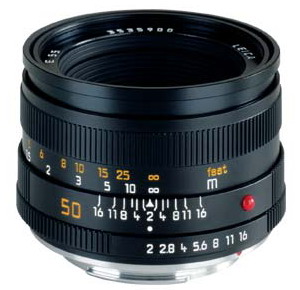Leica Summicron-R 50mm f2 Lens Review |
|
This lens was introduced in 1979, as the final evolution of the reflex version of Summicron 50, probably the most successful Leica lens of modern times.
Compared to the first version of this lens, released in 1964, this third version features, just like the second version (introduced 1976) a completely recalculated optical scheme, and a completely different barrel design. The most important change is of course the optical redesign, which improves the performance of the lens wide open, and improves the sharpness too, perhaps (like someone says) a little at the expense of wide open bokeh. There is no optical difference between the second and third version of the lens, the latter one being compatible only with the R reflex cameras (thus not any more with Leicaflexes).
Lens
Fact Sheet
This Summicron-R 50 third version was ranked second in a poll between photojournalists who had to decide about the best 50mm reflex lens of all time (the winner was the Zeiss Planar 1.4/50 in the Contax version). This Summicron-R 50 is a very useful lens that makes it possible for the amateur photographer to get a taste of Leica quality at an affordable price. The performance wide open suffers a slightly bit from vignetting, but already at f/2.8 it reaches top quality, that lasts throughout the whole aperture range. The colours of this lens have that slight cool cast that is typical of Leica lenses. Some people love it (as it makes for more realistic skin rendering), some people don't, but the latter can easily fix the problem by adding a good skylight filter in front of the lens. Digital camera users don't even need to do that as most digital reflex today offer automatic white balance. The images produced by this lens feature the remarkable detail and clarity that people usually associate with Leica lenses, and they are sure to never disappoint the demanding photography passionates. Â Tags: |

